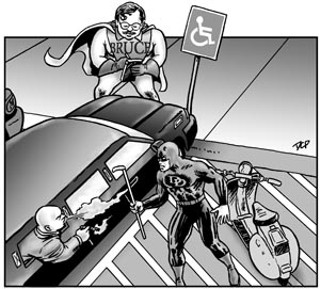The Lame, the Halt, and the Parking Thieves
Crusading against handicapped-parking violators
By Michael May, Fri., June 9, 2006

It's high noon on Friday, and Constable Bruce Elfant is cruising steadily through downtown, on the lookout for an increasing number of rotten scoundrels who apparently have no qualms about stealing precious pavement from the city's most vulnerable citizens. As he turns along 11th Street and passes the Capitol, the normally mild-mannered, mustached Elfant gets a gritty look in his eyes and begins gesturing at parked cars. "There's one," he says. "There's one. There's one. There's one. There's one." By some unimaginable coincidence, every single car parked along this particular block is showing a handicapped-parking hangtag, which allows the user to park at a city meter for free. In front of the attorney general's office, more than half are sporting the blue tags, hanging from the rearview mirrors. The same is true of the streets surrounding the Hobby State Office Building on Fourth and Guadalupe.
Is it possible that Texas state officials are so burdened by overwork – or have drunk so much of their own Kool-Aid – that it's physically disabled them? Perhaps – but Constable Elfant has another theory. "Maybe state agencies don't provide their employees with parking," he says. "Downtown parking has gotten scarce and costly. It can cost $150 to $200 a month for downtown contract parking, but you can park for free at a meter if you can buy, borrow, or forge a handicapped hangtag. It's really driven by laziness and economics." Elfant says most abused hangtags belong to the drivers' relatives, but some are being bought and sold at local flea markets, as well as on eBay.
Elfant has been on a crusade against handicapped-parking violators for more than a decade, after he witnessed a wheelchair-bound elderly woman struggle across a parking lot in a thunderstorm because cars without hangtags had taken all the handicapped spots. "It was awful," he remembers. "The access was there for her." None of the local law enforcement entities were seriously enforcing the disabled-parking laws. So, in 1995, Elfant built a citizen volunteer force able to ticket empty cars parked in handicapped spots without plates or tags. There are currently around 30 volunteers, many of them disabled themselves. They've written thousands of the $250 tickets over the years.
But the volunteer force is unable to deal with cars with suspect hangtags, a crime that has increased dramatically in past couple years. They are not police officers, and therefore do not have the authority to match drivers with hangtags, and neither do the city's parking meter enforcers. It's even difficult for police officers to catch perpetrators, because the hangtags only display the last four digits of the driver's license number and the person's initials. That leaves only one viable enforcement strategy: Wait patiently and then ambush offenders when they return to their cars.
That job belongs to Deputy Caroline Brammer, the only local law enforcement officer on the handicapped parking beat. She's assisted by Clarence Holt, the constable's handicapped coordinator, a quadriplegic who organizes the volunteer effort from the county's only voice-controlled computer, and who is himself out monitoring the city's hot spots two days a week. He's been a victim himself of the widespread abuse of handicapped parking – now it's payback time. "I've spent an hour or more just circling a business, waiting for a suitable space to open up," he says. "But I don't really take it personally. I just write a ticket. If you do the crime, you're going to have to pay the fine."
The constable's officers have seized 100 hangtags in the past six months, but say they've hardly made a dent in the problem. Elfant issued a report last month that showed a full 20% of the roughly 2,000 vehicles parked at downtown meters had hangtags, and, if prior enforcement trends hold true, a full 65% of those tags are bogus. In addition to the denial of access for those who really need the service, that also means the city is losing hundreds of thousands of dollars a year in meter revenue. "That's money that can be spent on city services or lower taxes," says Elfant. "These people are essentially stealing from their fellow taxpayers."
Elfant says that increased enforcement will easily pay for itself, and is urging the city to pitch in. The City Council responded May 25 with a resolution that directs the City Marshall's office to address the problem. "It's really just a matter of allocating more manpower," says Council Member Lee Leffingwell, who sponsored the resolution. "The city will use existing resources for now, but we have plans to allocate money for additional officers in the next six to eight weeks."
Until then, the terribly outnumbered constable's office will continue its lonely fight for righteous asphalt. The days are long, and the parking is scarce. The scum will get away with free parking … if they can. The only thing that stands in their way is an unassuming constable, his overworked deputy, and dozens of volunteer vigilantes who wait in the shadows with a ticket pad and a mission.
Got something to say on the subject? Send a letter to the editor.








